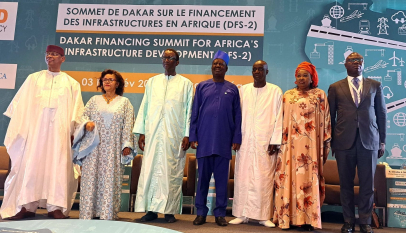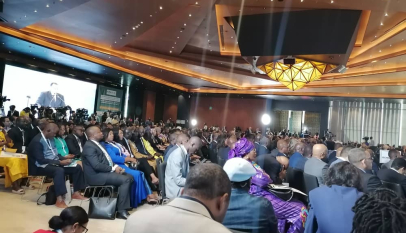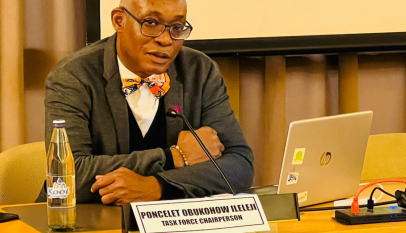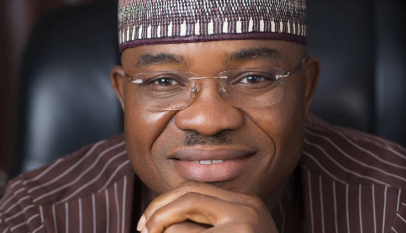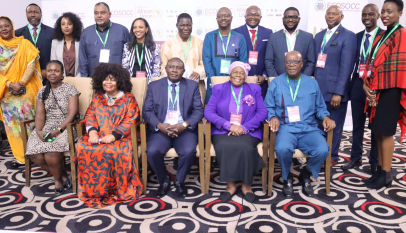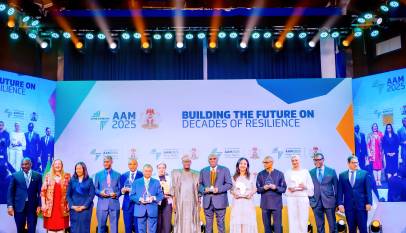INTERVIEW | Without a functioning railway system in Africa, AfCFTA will remain a mirage! – Olawale Rasheed
Olawale Rasheed is the director of the African Railway Roundtable (ARR), focused on advocacy for accelerated implementation of Africa’s Integrated High Speed Railway Network Project (AIHSRN)
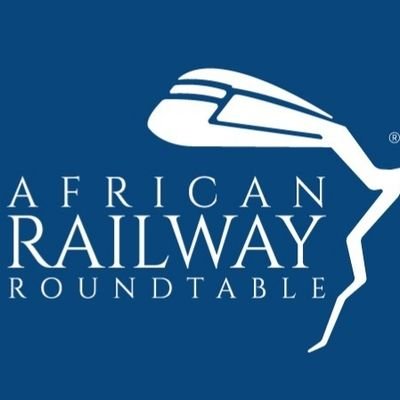
Newspage: What is the African Railway Roundtable all about?
Rasheed: African Railway Roundtable is inspired by the belief that expansion of railway network in Africa is the foundation for rapid development of the continent. We think we have disappointed our own continent. The colonialists left a fairly functioning railway network all over the continent, but between late 60s, 70s, and 80s, the railway network in most African countries, became moribund. The fact that we cannot even maintain what we inherited is an indictment on us.
So, we are now embarking on an advocacy to African governments, showcasing what is happening in other parts of the world, in order to make them understand that if you want to move fast in terms of development, you to need connect your people together via a railway network. For example, there used to be a plan to link Maiduguri to Ndjamena and then to Khartoum. It’s dead!
Therefore, we are basically focused on sensitization regarding how railway is enhancing development in Asia, in Latin America, the continental Europe and North America so as to convince our leaders to now say, “Okay, this is feasible. It’s possible. We can do it.”
Newspage: How far do you think railways will go in advancing Africa’s development, particularly in terms of facilitating trade and industrialization, since lack of effective transport infrastructure is one of the major hindrances for intra-African trade?
Rasheed: Luckily, the time we started the African Railway Roundtable two years ago was also the period the African Continental Free Trade Area (AfCTA) was gaining ground and the ratifications of the AfCFTA and its takeoff were about to happen. Now, the question is how do you enhance intra-African trade when to move goods and services to Khartoum and Ndjamena from Maiduguri in Nigeria is still a problem? When to fly to Yaoundé from Nigeria is a problem? It’s so funny that to fly to Bamako you have to go enroute Abidjan or Addis.
We are now talking about implementing the AfCFTA which means we must move goods, services must be exchanged, and people must move around the continent. To achieve that successfully, we need to link our capitals, not only by roads which is very costly and damaging to the environment, instead through rail. We need to connect our economic zones so we can trade more with each other more than we are trading with outsiders like EU and North America.
However, I think African Union leaders are doing well in terms of fast-tracking railway development. This is because if you look around the regions of Africa, you’ll realize there is a competition among the leaders in terms of building railways. The region I love most is East Africa, where there is competition between Kenya, Tanzania, and Rwanda; Uganda is also waking up. You can see how they’re connecting the railways to the ports so as to achieve what is referred to as an intermodal system, whereby the railway is linked to the port and goods and containers are moved into the hinterland straight from the port.
Basically, I think you can fast-track trade issues and creation of wealth more by expanding, and modernizing African railways and that is why the Programme for Infrastructure Development in Africa (PIDA) and the New Partnership for Africa’s Development (NEPAD) programmes are very commendable. The next stage is for such progressive visions to be bought over by the people of Africa.
We are also supposed to have a Trans-West African railway line that will run from Lagos through Benin, Togo, Ghana, and beyond. Such that if you’re producing in Nigeria, you can simply rail freight your goods, and before you know it, it is already in Ivory Coast and The Gambia. Indeed, railway is key to the AfCFTA. In fact, I will say, without a functioning railway system in Africa, AfCFTA will remain a mirage!
Newspage: Like you said, a lot of railway infrastructure projects are currently ongoing in Africa, predominantly in East Africa, but also in West Africa particularly here in Nigeria. But there are criticisms of these projects in Nigeria because of the way they are being funded through foreign loans, mostly from the Chinese. Don’t you think its high-time African private sector come together to fund these projects?
Rasheed: Good! I understand our people’s concerns and worries about loans and debts, I understand the apprehension of the people that we are taking too much loans and the question that are we not bothering the future generation with debts? These are genuine concerns but whoever is thinking in these direction should also know that we have previously squandered our opportunities. There were times when we had resources but we failed to invest, we failed to build these infrastructures.
We squandered our resources then, now what we are left with only two options: it’s either we don’t build these infrastructure at all and be left behind by the world and the opportunities provided by the AfCFTA, or we go ahead and build these infrastructure but we get very smart about it so that it will be sustainable and we do not fall into debt traps.
Let me start by first commending the Buhari administration in Nigeria for actually fast-tracking and accomplishing many of these projects that are being criticized. For example, the Itakpe-Warri railway line was under construction for almost 30 years. It’s now completed. The Lagos-Ibadan line is now a Standard Gauge Rail (SGR). The Abuja-Kaduna SGR is already functioning while Kaduna-Kano SGR is underway.
Noteworthy is the fact people are worried that we are taking too much loans and that the cost is high, these are valid concerns and that is why while commending the government, it is also important to caution the government to be very smart, especially in terms of the costing of the projects, even though I know the interest from the loans is less than 3 percent and the payment terms, I think, is 20 years. Hopefully, if we run the railways well, and we are smart enough to combine the movement of passengers with freight services, i.e the movement of passengers with the movement of goods, we are likely to get out of the loans well.
Now, it is important for African governments to be conscious of costing. We should always be able to do a comparative analysis of the costing of SGR in Nigeria, SGR in Ghana, SGR in Ethiopia, and SGR in Tanzania. This is to ensure that when we are negotiating contracts and loans we don’t fall into debt traps. Going forward, it is important for African governments to be conscious of this comparative analysis, in terms of costing so as to ensure we are not shortchanged.
Overall, if we refuse to take these loans, the reality is that we will not be able to build these infrastructure and if we fail to build these infrastructure, I want to tell you the rest of Africa will leave us behind. But we really need to be smart about taking these loans. Now, on the subject of Chinese loans, you know there are a lot of criticisms about them.
What I tell people is that their criticisms are valid but only the Chinese were ready to give us loans. No other creditors were ready to do so. Now, what I think Nigerians should be worried about is ensuring that the projects we took loan for are actually implemented so that when we are paying for these loans in the future, our children will at least know why we incurred those debts. You can’t avoid loans but you must be very smart about taking them.
Newspage: There are talks about African private sector coming together, probably under the guidance of African Union, to build a kind of framework for financing these projects. Do you think Africa needs a unified approach in responding to this issue?
Rasheed: You see, the reality is that an average government in Africa is always scared of the private sector. That’s why most governments in Africa think, “We can do it! We don’t need the private sector.” But they have failed to realize that because of bureaucracy and its associated inefficiency, governments cannot make development possible. China is different because it is not a democracy. China has a power of compulsion. However, we are running democracies in Africa.
Now, most of these railway projects can be taken up by the private sector. I see no reason why we must not concession these projects to the African private sector to fund, run and make their profits, after some years they can hand them over to the government. But unfortunately, most governments in Africa are afraid of the private sector; to me that is a very wrong kind of thinking.
If you encourage the local private sector, you create more wealth, you gain more efficiency, and, most importantly, you create more jobs especially because we are currently faced with unemployment. So, it is only right for Africa as a whole to look more toward the private sector, and we have one great example in Tanzania, which we must commend.
In Tanzania, when they engaged Turkish companies to execute a railway project, they said all the engineering jobs were to be done by the Army Corps of Engineering in Tanzania, so that they will learn about laying railway tracks, among other things. They also asked the Turkish firms to do what I call localization, in other words, to ensure local content such that if company “A” is handling track A to B, they must have local Tanzanian companies working with them. This will not only help build local capacity but will also create jobs.
In terms of funding and financing, Africa needs to look towards African Export–Import Bank (AFREXIM) and African Development Bank (AfDB). Luckily, AFREXIM has a window for railway funding now and they are eager to fund railways projects. AfDB is also eager. AfDB recently provided funding to Ethiopia for a feasibility study on Ethiopia-Sudan rail line, which is a good development.
We have many companies in Africa with partners in Europe, America and Asia that can do most of these jobs but our governments are unwilling to work with them. For example, there is nothing wrong in getting a private sector company to take up the Kaduna-Kano SGR. It’s feasible! But we must commend the government of Nigeria because the Kano-Maradi line is now being taken up by a consortium of various local companies, the government is just being a guarantor, that model is a good one.
Henceforth, we must adopt that model of executing railway projects. To be frank, we need private sector to come on which means governments need to encourage the private sector, not for the sake of the private sector, but for the sake of government. Only private sector can create wealth and create jobs, and since efficiency is key, it is only private the sector that can deliver it.
Editor’s note: This interview has been edited for length and clarity


